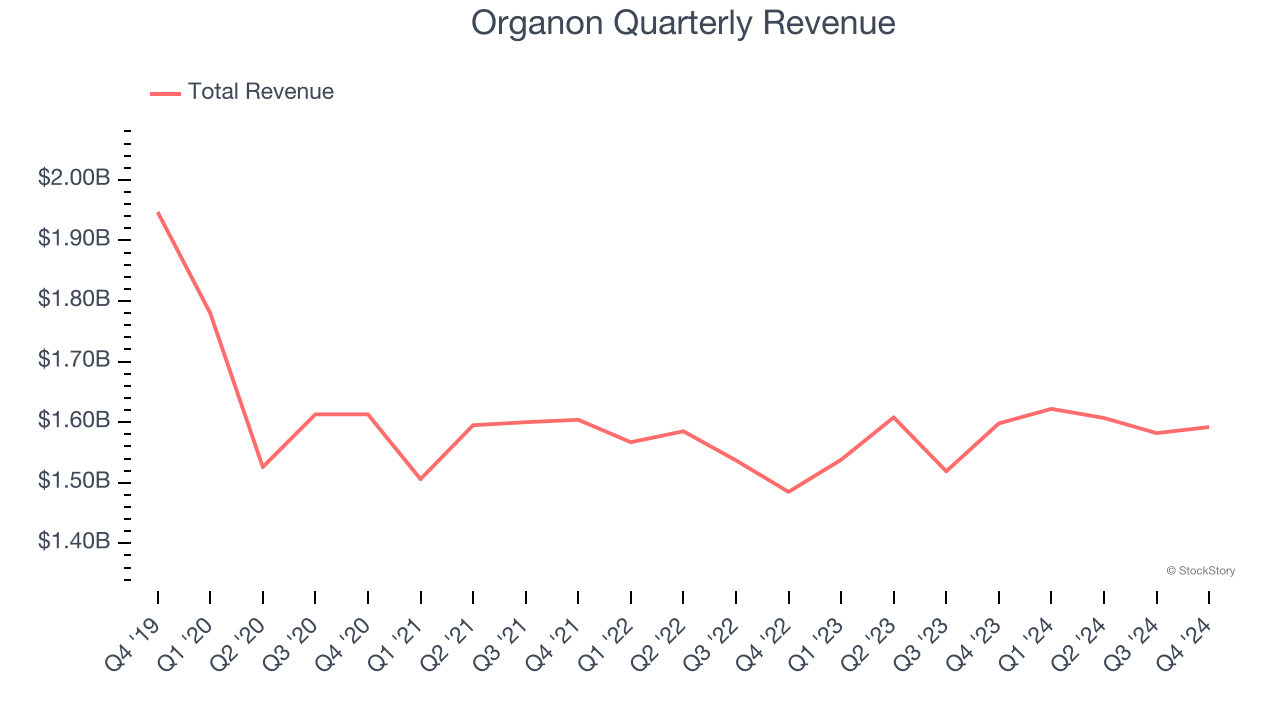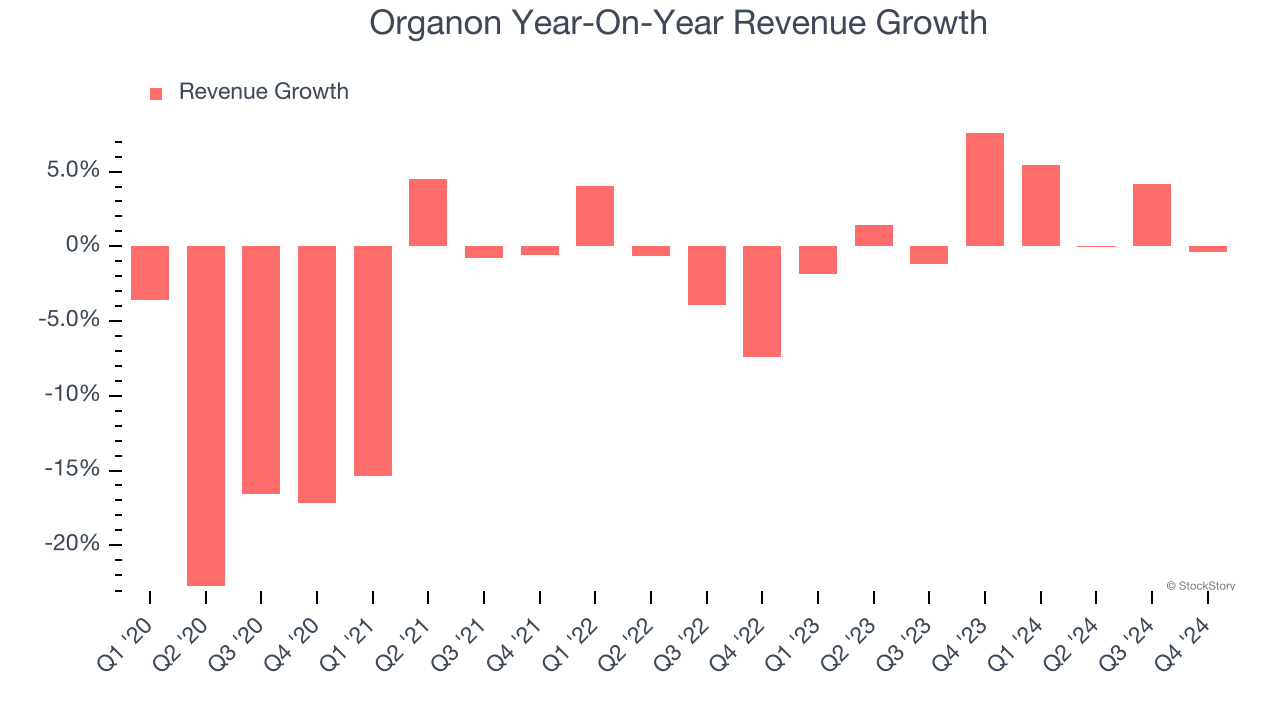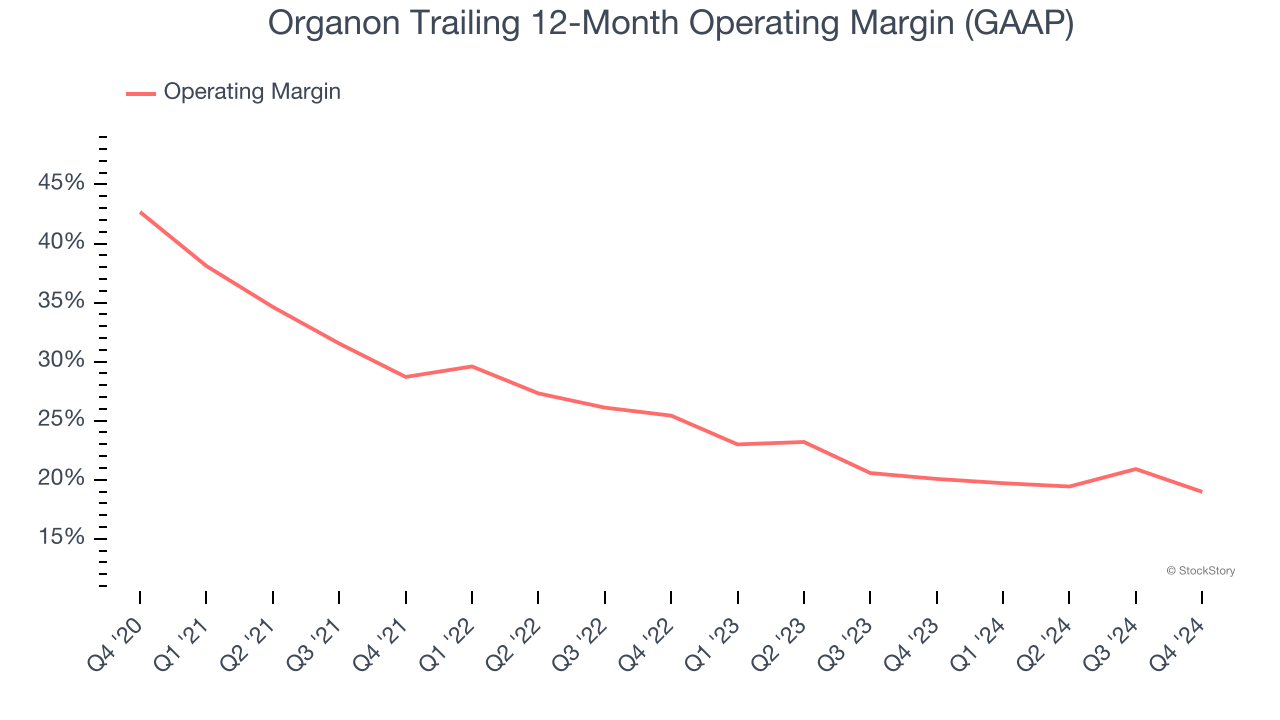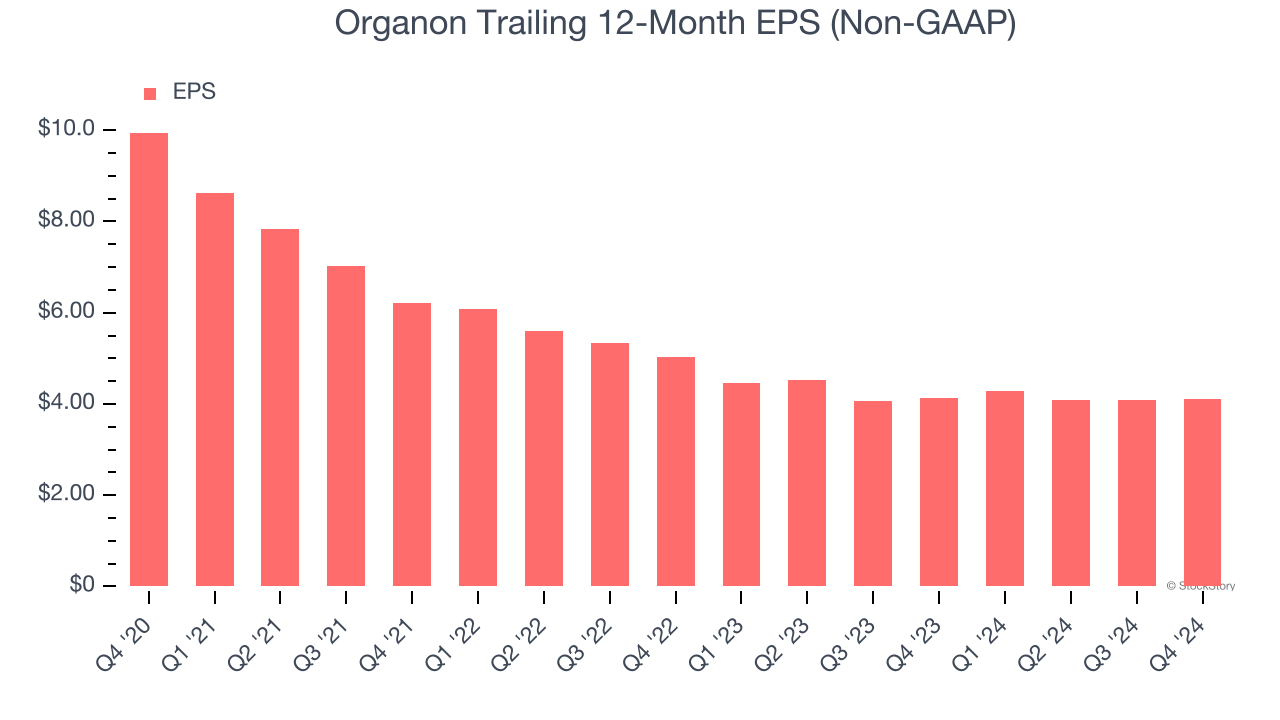
Pharmaceutical company Organon (NYSE: OGN) reported Q4 CY2024 results exceeding the market’s revenue expectations, but sales were flat year on year at $1.59 billion. On the other hand, the company’s full-year revenue guidance of $6.23 billion at the midpoint came in 3.2% below analysts’ estimates. Its non-GAAP profit of $0.90 per share was 3.9% above analysts’ consensus estimates.
Is now the time to buy Organon? Find out by accessing our full research report, it’s free.
Organon (OGN) Q4 CY2024 Highlights:
- Revenue: $1.59 billion vs analyst estimates of $1.58 billion (flat year on year, 0.9% beat)
- Adjusted EPS: $0.90 vs analyst estimates of $0.87 (3.9% beat)
- Adjusted EBITDA: $448 million vs analyst estimates of $453.1 million (28.1% margin, 1.1% miss)
- Management’s revenue guidance for the upcoming financial year 2025 is $6.23 billion at the midpoint, missing analyst estimates by 3.2% and implying -2.8% growth (vs 2.3% in FY2024)
- Operating Margin: 8.1%, down from 15.9% in the same quarter last year
- Market Capitalization: $3.79 billion
“In 2024 we achieved our third year of constant currency revenue growth and delivered Adjusted EBITDA margin expansion ex-IPR&D,” said Kevin Ali, Organon's Chief Executive Officer.
Company Overview
Founded in 2020, Organon (NYSE: OGN) offers healthcare products focused on women's health.
Branded Pharmaceuticals
The branded pharmaceutical industry relies on a high-cost, high-reward business model, driven by substantial investments in research and development to create innovative, patent-protected drugs. Successful products can generate significant revenue streams over their patent life, and the larger a roster of drugs, the stronger a moat a company enjoys. However, the business model is inherently risky, with high failure rates during clinical trials, lengthy regulatory approval processes, and intense competition from generic and biosimilar manufacturers once patents expire. These challenges, combined with scrutiny over drug pricing, create a complex operating environment. Looking ahead, the industry is positioned for tailwinds from advancements in precision medicine, increasing adoption of AI to enhance drug development efficiency, and growing global demand for treatments addressing chronic and rare diseases. However, headwinds include heightened regulatory scrutiny, pricing pressures from governments and insurers, and the looming patent cliffs for key blockbuster drugs. Patent cliffs bring about competition from generics, forcing branded pharmaceutical companies back to the drawing board to find the next big thing.
Sales Growth
A company’s long-term sales performance can indicate its overall quality. Any business can put up a good quarter or two, but many enduring ones grow for years. Organon’s demand was weak over the last five years as its sales fell at a 3.6% annual rate. This was below our standards and is a sign of poor business quality.

We at StockStory place the most emphasis on long-term growth, but within healthcare, a half-decade historical view may miss recent innovations or disruptive industry trends. Organon’s annualized revenue growth of 1.8% over the last two years is above its five-year trend, but we were still disappointed by the results. 
This quarter, Organon’s $1.59 billion of revenue was flat year on year but beat Wall Street’s estimates by 0.9%.
Looking ahead, sell-side analysts expect revenue to decline by 1% over the next 12 months, a slight deceleration versus the last two years. This projection is underwhelming and suggests its products and services will see some demand headwinds.
Here at StockStory, we certainly understand the potential of thematic investing. Diverse winners from Microsoft (MSFT) to Alphabet (GOOG), Coca-Cola (KO) to Monster Beverage (MNST) could all have been identified as promising growth stories with a megatrend driving the growth. So, in that spirit, we’ve identified a relatively under-the-radar profitable growth stock benefiting from the rise of AI, available to you FREE via this link.
Operating Margin
Organon has been an efficient company over the last five years. It was one of the more profitable businesses in the healthcare sector, boasting an average operating margin of 27.3%.
Looking at the trend in its profitability, Organon’s operating margin decreased by 23.7 percentage points over the last five years. The company’s two-year trajectory also shows it failed to get its profitability back to the peak as its margin fell by 6.5 percentage points. This performance was poor no matter how you look at it - it shows operating expenses were rising and it couldn’t pass those costs onto its customers.

In Q4, Organon generated an operating profit margin of 8.1%, down 7.8 percentage points year on year. This contraction shows it was recently less efficient because its expenses increased relative to its revenue.
Earnings Per Share
We track the long-term change in earnings per share (EPS) for the same reason as long-term revenue growth. Compared to revenue, however, EPS highlights whether a company’s growth is profitable.
Organon’s full-year EPS dropped 106%, or 19.8% annually, over the last four years. We tend to steer our readers away from companies with falling revenue and EPS, where diminishing earnings could imply changing secular trends and preferences. If the tide turns unexpectedly, Organon’s low margin of safety could leave its stock price susceptible to large downswings.

In Q4, Organon reported EPS at $0.90, up from $0.88 in the same quarter last year. This print beat analysts’ estimates by 3.9%. Over the next 12 months, Wall Street expects Organon’s full-year EPS of $4.11 to shrink by 1.9%.
Key Takeaways from Organon’s Q4 Results
It was good to see Organon top analysts’ revenue and EPS expectations this quarter. On the other hand, its full-year revenue guidance and EBITDA missed. Overall, this quarter could have been better, but the stock traded up 2.1% to $15 immediately after reporting.
Is Organon an attractive investment opportunity at the current price? What happened in the latest quarter matters, but not as much as longer-term business quality and valuation, when deciding whether to invest in this stock. We cover that in our actionable full research report which you can read here, it’s free.




